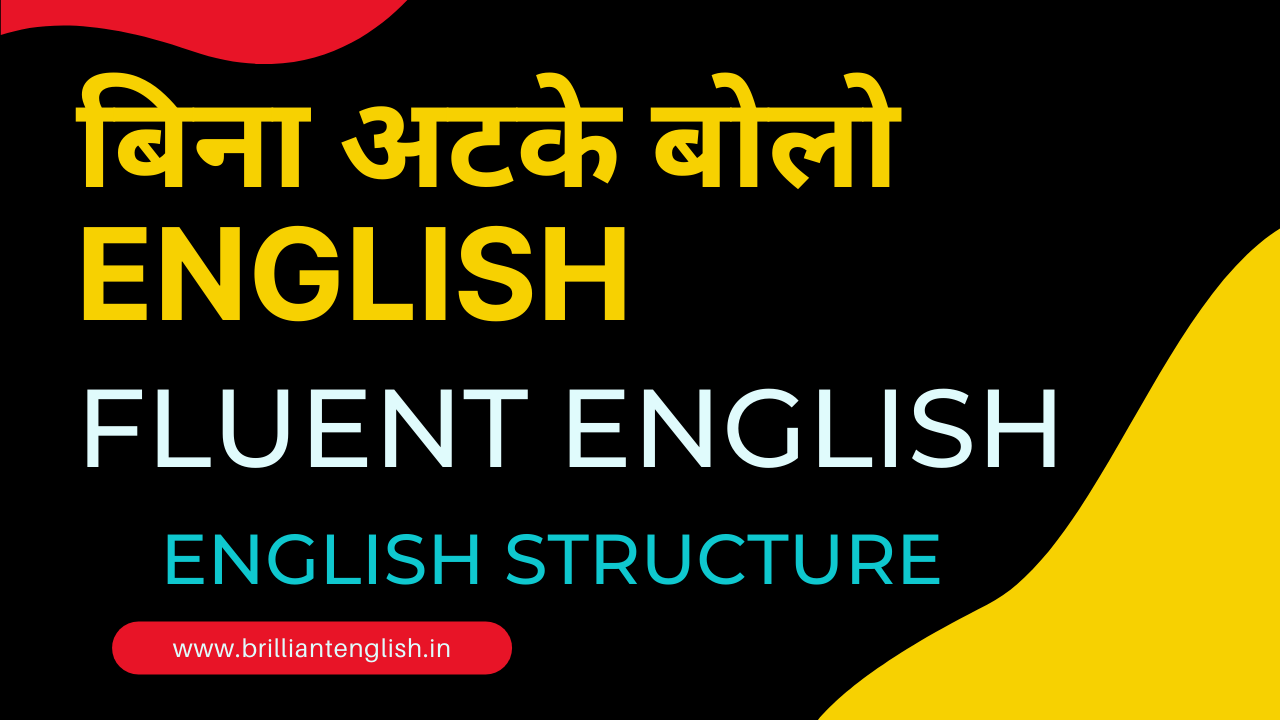The best way to speak English fluently is to learn the advanced spoken English structures in Hindi. These amazing and useful structures are going to be turning point in your English learning journey.
If you learn a new structure, with that you can create hundreds sentences.
advanced spoken English structures in Hindi
(1) supposed to – (ही वाला)
Structure :
Sub + is / are / am / was / were + supposed to + V¹ + obj
Examples
वह गांव जाने ही वाला है। He is supposed to go to Village.
वे लोग कल कार खरीदने ही वाले थे। They were supposed to purchase a car yesterday.
तुम तो कल आने वाले थे न ? You were supposed to come yesterday ?
वह किसी भी समय यहां आने ही वाला है। He is supposed to arrive here at any moment.
ट्रेन सात बजे आने वाली है। The train is supposed to come at 7 o’clock.
(2) compulsion to – (मजबूरी)
Structure
It is/was + my/your/his + compulsion + to V¹ + obj – (मेरी / तुम्हारी/ उसकी मजबूरी है)
Examples :
मेरी मजबूरी है सुबह पांच बजे उठना। It was my compulsion to wake up at 5 o’ clock morning.
तुम्हारी मजबूरी है उसे बर्दाश्त करना। It is your compulsion to tolerate him.
हमारी मजबूरी थी वहां जाना। It was our compulsion to go there.
यह उसकी मजबूरी कि वह मुझसे बात करें। It is her compulsion to talk to me.
(3) It makes no difference – (मुझे कोई फर्क नहीं पड़ता)
Structure
It + makes no difference + sub + V¹ – (मुझे कोई फर्क नहीं पड़ता)
OR
It doesn’t matter whether + sub + V¹
आप ऊपर के दोनो में से कोई भी एक तरह से English बोल सकते हैं।
Examples :
मुझे कोई फर्क नहीं पड़ता कि तुम आओ या न आओ। It doesn’t matter whether you come or not.
मुझे कोई फर्क नहीं पड़ता कि वह काम करें या न करे। It doesn’t matter whether he works or not.
मुझे कोई फर्क नहीं पड़ता कि वह बोले या न बोलें। It doesn’t matter whether he speaks or not.

(4) It was + one’s + who… (उसने ही तो)
Structure :
It was/is + I/you/we/he/her + who + Verb
उसने ही तो मुझे पैसे दिए थे तुम्हें पीटने के लिए। It was his who gave me money to beat you.
मैंने ही तो बुरे समय में तुम्हारी मदद किया था। It was I who helped you in bad time.
उसने ही तो मुझे जीवन का अर्थ बताया। It was he who taught me meaning of life.
Useful Spoken English Structures
(5) no longer need – ( अब और ज़रूरत नहीं )
Structure :
Sentence + no longer need + noun
अब तुम जा सकते हो मुझे तुम्हारी जरूरत नहीं। Now you can go, I no longer need you.
मुझे अब और इस मोबाइल की ज़रूरत नहीं है। Now I no longer need this mobile.
उसे अब और कोई दवा की ज़रूरत नहीं है। Now he no longer need any medicine.
(6) till death / until I die – (मरते दम तक)
Structure:
Sentence + until I/you/we/he + die
तुम अपना पहला प्यार मरते दम तक नहीं भूल सकते। You can’t forget your first love untill you die.
मैं आपका एहसान मरते दम तक नहीं भूलूंगा। I will not forget your favour till death.
मैं अपने दुश्मन के घर मरते दम तक नहीं जाऊंगा। I will not go to my enemy’s house until I die.
Frequently used Spoken English Structures
(7) think …..should – (लगता है)
Structure :
Sub + think + sub + should + V¹
मुझे लगता है कि तुम्हें यह नौकरी करनी चाहिए। I think, you should do this job.
मुझे लगता है कि हमें अब चलना चाहिए। I think, we should leave now.
मुझे लगता है कि उससे बात करनी चाहिए। I think, I should talk to him.
(8) sub + thinking of + ing – ( करने की सोच रहा हूं )
Structure :
Sub + thinking of + V⁴ (ing) + noun
मैं नौकरी करने की सोच रहा हूं। I am thinking of doing a job.
हमलोग नई कार खरीदने का सोच रहे हैं। We are thinking of buying a new car.
वह दिल्ली जाने का सोच रहा था। He was thinking of going to Delhi.
(9) on the pretext of – ( किसी बहाने से)
Structure :
Sentence + on the pretext of + V⁴ (ing) + obj
स्कूल जाने के बहाने से वह पैसे मांग रहा था। He was asking for money on the pretext of going to the school.
वह बाज़ार जाने के बहाने से मुझसे मिलने आई। She came to meet me on the pretext of going to the market.
वह मंदिर जाने के बहाने से घर से निकली। She left home on the pretext of going to the temple.
(10) making rounds of – ( चक्कर काटते-काटते
Structure :
Sentence + making rounds of + noun
वह बैंक के चक्कर काटते-काटते तक गया है। He is tired of making rounds of the bank.
वे लोग हस्पताल के चक्कर काट-काट कर थक गए। They were tired of making rounds of the hospital.
लड़के मैदान के चक्कर काट-काट कर थक गए हैं। The boys got tired of making rounds of the ground.




